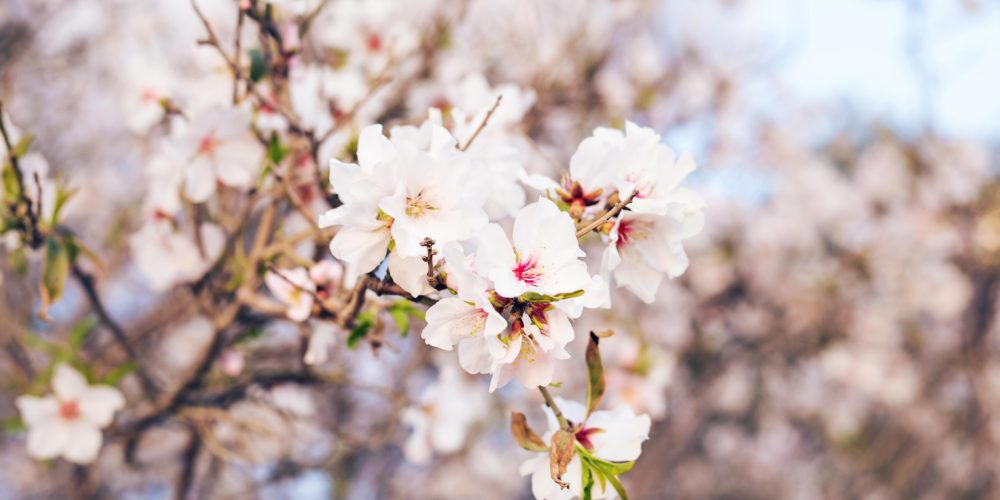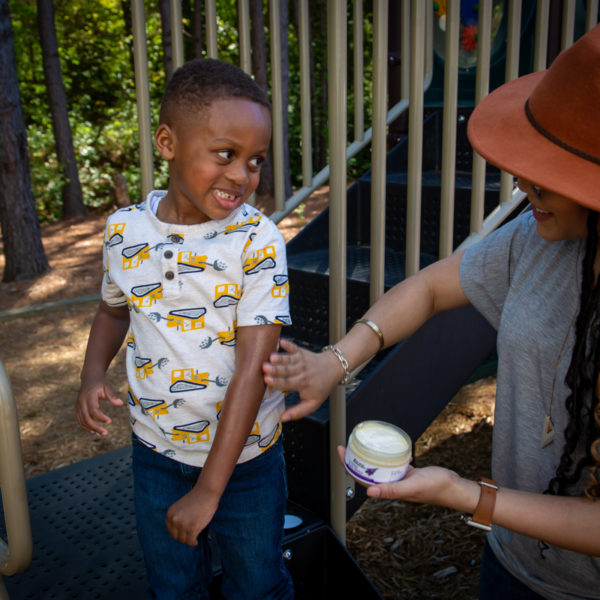Winter has finally given us a break and spring is here! The flowers are blooming, the birds are chirping, the weather is good, and barbecue grills are being fired up as we speak. Now in case you didn’t catch it, I just said the FLOWERS ARE BLOOMING! For those of you who do not suffer from seasonal allergies or have children with hay fever and eczema, you were probably counting down the days until spring. However, for the rest of us, spring is wreaking havoc on us! It’s like the pollen is falling from the heavens like rain and pouring down on everything and everyone.
You may be wondering, why is “surviving the spring transition” a topic on an eczema blog. Well, just like asthma, children with eczema have a high risk of developing seasonal allergies. According to the National Eczema Association, up to 80% of children with eczema will develop hay fever, asthma, and food allergies. Keep in mind that this is also the time of the year when the weather is unpredictable and sporadic climate changes can trigger eczema flares.
For more information on how eczema, allergies, and asthma are related, check out my previous blog here.
So as a caregiver of a child with eczema or as a seasonal allergy suffer yourself, how do you survive transitioning from winter to spring, without losing your mind? After all, you want to enjoy the nice weather outside and a good ole fashion barbecue too, right! Well, My Itchy Brown Skin is here to help. Below are a few tips that my husband and I have used with our son that may help you and your eczema warrior enjoy the next few months.
Spring Forward and Survive the Transition….
- Recognize the signs of hay fever. Look for signs of itching, sneezing, wheezing, and coughing as an indicator of hay fever, especially if your child has been exposed to common allergens such as ragweed, pollen, or dust (spring cleaning).
- Research Seasonal Allergy OTC and Organic Products. There are several over the counter (OTC) and organic products to assist you with managing your child’s eczema and seasonal allergies during this time of the year. Research different OTC products to find out what works best for you and your family and incorporate them into your daily routine. We use a variety of organic and OTC products to manage our son’s flares and seasonal allergies. We prefer to use creams rather than lotions to moisturize and protect his skin during this time of the year, as they focus on moisturizing the skin, but do not block the pores. Creams are also great for serving as barriers to protect the skin from external elements. Antihistamines are also a great temporary solution to treat hay fever and provide relief during the seasonal change. However, if you find yourself relying on antihistamines outside of the normal seasonal change to manage allergy related symptoms, please consult a medical professional on long-term usage.
- Practice Proper Bathing Techniques. It is important that you wash away the pollen and other environmental elements associated with spring, as it will prevent the skin from breaking out and will minimize reactions related to seasonal allergies. Washing the pollen from your child’s skin and removing contaminated clothing is a proactive way to combat allergic reactions.
- Moisturize the Skin. Moisturize your child daily and immediately after bathing (within three minutes is a good rule of thumb). Moisturizing the skin is critical to preventing a breakout. Leaving the skin too dry can initiate a flare-up, as it causes the skin to become irritated and itchy. Moisturizing regularly also ensures that the skin is protected from environmental elements that can lead to a flare. We typically moisturize our son’s skin twice a day (three at the most) to keep his skin moisturized and minimize breakouts.
- Layer Up! If you live in the Southeast, you know that the weather in the spring can be quite unpredictable. We have a saying here in Georgia that says, “if you don’t like the weather….just wait!” To avoid triggering an eczema flare or sparking an allergy attack, make sure you are dressing your little one appropriately for the weather. Dress your child in layers to prevent overheating, avoid tight fitting clothing and itchy fabrics.
- Invest in Insect/Mosquito Repellants If you plan on traveling during the season or venturing outside, invest in a good insect/mosquito repellant. Spring weather means insects and those annoying mosquitos! There’s nothing worse than a mosquito bite to trigger an eczema flare and a full-on itch fest. Be sure to select an insect repellant that caters to sensitive skin and be aware of products that contain DEET. DEET may irritate children with sensitive skin and may create issues for those who suffer from eczema. Therefore, consider choosing products with at least 20% Picaridin, as it is just as effective as DEET and is a great alternative for sensitive skin. If you wish to use an insect repellant that contains DEET, test the repellent on a small area on the arm first and then wait 12-24 hours to see if it triggers a reaction.
- Consider Allergy Testing/Seek Medical Advice Those with a severe case of allergies may benefit from allergy testing. I can personally say that allergy testing for our son provided clarity to numerous unexplained allergic reactions and eczema breakouts. Always seek medical advice from your child’s pediatrician and allergist for guidance on managing your child’s allergies and eczema.
Try to Relax and Enjoy…
Try to relax and enjoy the spring months. After all, it is a beautiful time of the year and just think, you are only a few months away from enjoying your summer activities. Hopefully, by following the helpful tips provided above, you will not only SURVIVE this season, but you and your little one will THRIVE this season! So, flowers KEEP BLOOMING, we are ready for you!




Leave a Reply